Cancelled Game Boy Advance Games

The Game Boy Advance had a large software library, but a few games were announced but never saw release. While many of them were redesigned and released under a different guise, a few have simply never been seen again.
This feature covers what we know about the lost first-party Game Boy Advance games.
Diddy Kong Pilot
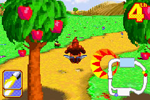
A circuit racing game that took the pilot stages from Diddy Kong Racing as its inspiration. Unlike its predecessor, Diddy Kong Pilot featured a cast of Kongs and Kremlings rather than Diddy Kong's cute animal friends.
The game was designed to be used with a tilt sensor game pak, so the racers could steer, ascend and descend on the course. Obstacles, items and speed boosts would appear at different altitudes.
The game was dropped when Rare left Nintendo to join Microsoft Game Studios. Rare continued its handheld development however, and Diddy Kong Pilot was retooled and later released as Banjo-Pilot, featuring the cast of Banjo-Kazooie in place of the Kongs.
Donkey Kong: Coconut Crackers
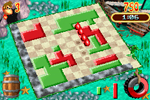
Announced in 2001, Donkey Kong: Coconut Crackers was a puzzle game where coloured coconuts dropped down and you had to move them to make rectangular shapes from the coloured blocks on the play area. A Kremling moved around the edge of the screen, reducing the play area, and it could be fended off with one of DK's animal buddies.
The game was cancelled in 2002 when Rare left Nintendo to join Microsoft Game Studios. Coconut Crackers was later redeveloped into It's Mr. Pants, starring the crudely drawn mascot from Rare's website.
Donkey Kong Plus
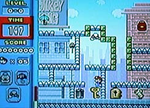
Shown at E3 2002 as a proof-of-concept for the GCN-GBA Link Cable, and based on the Game Boy Donkey Kong.
The game allowed you to create levels on the Game Boy Advance and play them on the GameCube on a TV screen. However, the other GCN-GBA Link Cable titles were GameCube titles, so it's not clear exactly which system this game was supposed to feature.
The game disappeared from release lists, and it's believed it was later developed into Mario vs. Donkey Kong, which didn't use the GCN-GBA Link Cable, nor did it have a level editor. However, a prototype level editor was found hidden in the game code.
Game Boy Music
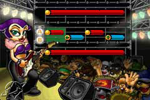
Originally in development for the Game Boy Color, Game Boy Music was a rhythm-action title that required the player to hit the right notes during a song. The game featured 45 songs and a selection of around 50 instruments and allowed for up to 5-player jam sessions. The game was announced in March 2001 and was due to be released the following September.
The game was to be packaged with the Game Boy Speaker, a small, portable external speaker that improved the sound quality of the game.
Unfortunately, the title which had been brought to the Game Boy Advance thanks to its improved sound was once again dropped due to the inability for single-cart multiplayer during jam sessions. The game was later revived (after 10 years in development) and became one of the Japanese launch titles for the Nintendo DS under the name Great Concert! Band Brothers.
Battland
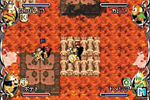
An action-strategy game developed by HAL Laboratory and shown at Nintendo's Space World 2001.
Very little is known about the game. From the small amount of information revealed, the game was driven more by its action, with strategy deciding your success against the enemies. The positioning of characters in your party would be instrumental, allowing even weaker characters to overcome stronger foes.
Luna Blaze
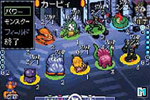
Listed as a simulation-RPG, again developed by HAL Laboratory and shown at Nintendo's Space World 2001.
The game required you to recruit monsters and summon their attacks to overcome the opponent in large group battles. There were planned to be over 170 kinds of attack, and the attacks would be summoned by energy balls. You would have to distribute the energy to the creatures' attacks.
Warlocked 2 / Wizards

The original Warlocked on Game Boy Color was a co-development between Bits Studios and Nintendo of America, and was critically acclaimed for being a decent, playable real-time strategy game on an 8-bit system with 2 buttons.
Bits Studios began developing a sequel for the Game Boy Advance and a lot of progress had been made through the game's development, but Nintendo of America was not interested in publishing a sequel.
Bits Studios took the game onto the market under the title of Wizards, but they were unable to find a publisher. The game was eventually dropped.